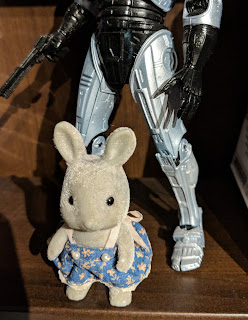Foundation's Edge (Foundation Series, Book 4)
Isaac Asimov, 1982
Hugo Award Winner - 1983
Premise: The Foundation has worked for five hundred years to ensure that an era of prosperity and relative peace will arise with a Second Galactic Empire in another five hundred years. The only threat to the technological supremacy of the Foundation were the telepaths of the Second Foundation, but they were defeated two hundred years earlier. Councilman Golan Trevize of the Foundation believes that the Second Foundation still exists. Speaker Stor Gendibal of the Second Foundation believes that some unknown force in the universe is also working toward shaping the future of the galaxy for its own ends.
Once upon a time (about a decade back?) I read the first two (or three?) books in the Foundation series. I liked them, but never read the next one. I honestly can't remember why...maybe the second wasn't as good as the first?
I was able to pick right up with this entry in the series. This makes sense, though, as it was written many years after the first three. It helps to know the basic premise of the Foundation books: it is possible to predict mathematically the large-scale movement of society, and the Foundation exists to implement a plan that uses this math to steer society in order to prevent thousands of years of dark age after the fall of the galactic empire. That's all explained in this book, but it's easier to go in knowing.
I very much enjoyed this entry - I like how complicated the plot becomes. Nearly every character has an open agenda, a hidden agenda, perhaps an implanted agenda that they are unaware of... it's tricky, with telepaths. The characters aren't tremendously compelling individually, but they are at least interesting and amusing.
Trevize's search becomes intertwined with research about the sources of humanity in the galaxy: speculation and myths about Earth. Some possible answers are given that I thought were intriguing, and I liked that there were little ties back to other books/series by Asimov. This felt a little like... not a magnum opus, but a nexus-book, something that loops together themes from many different previous works.
Unfortunately, I found the ending a little less satisfying than the build-up, and there was a bit of stuff left annoyingly hanging for a sequel. Also in the last section of the book we run into the character Bliss, and while she isn't terrible, the frequent discussion of her attractiveness made me weary.
It was still a solid read.
4 Stars - A Very Good Book
List of Hugo Winners




Comments
Post a Comment
FYI: Most comments are moderated, and will not appear immediately.